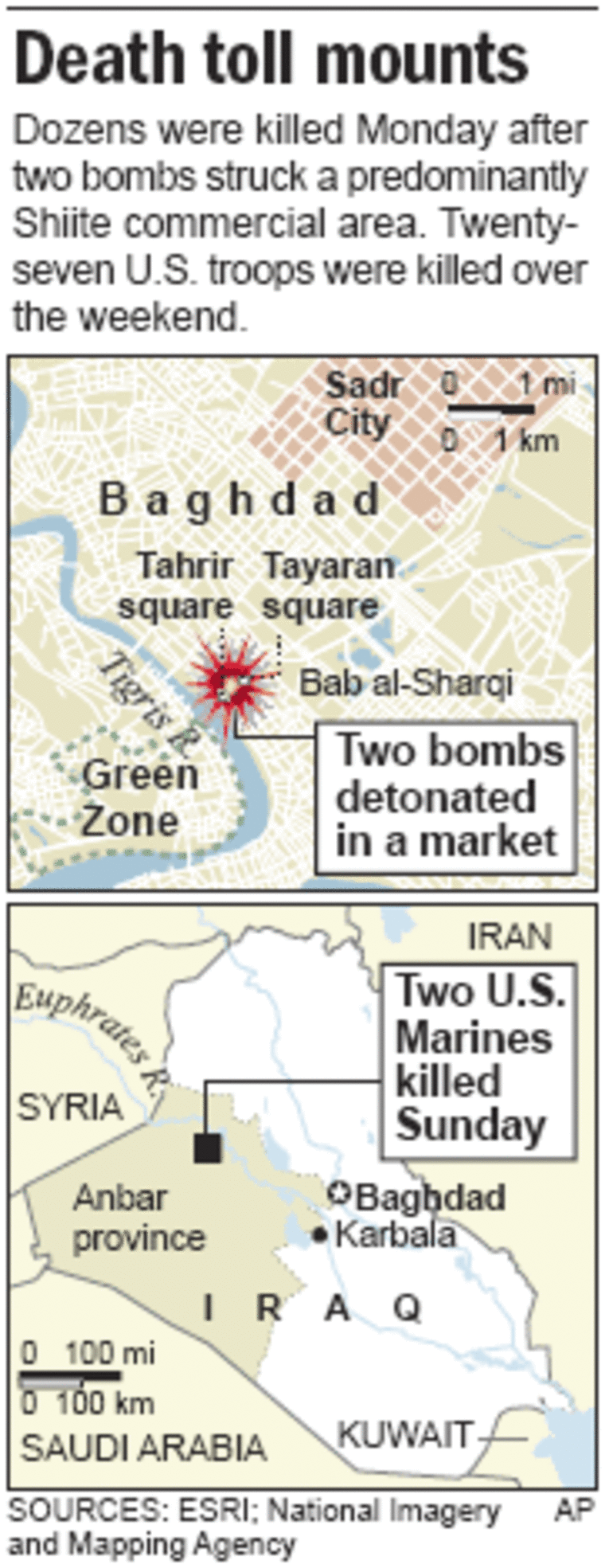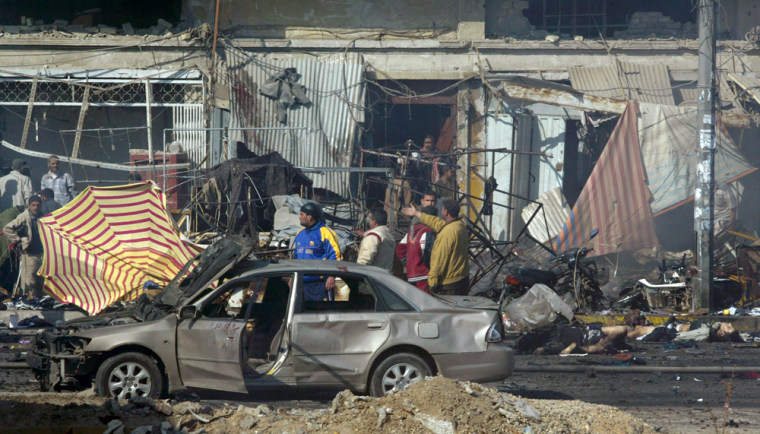A suicide bomber crashed his car into a central Baghdad market crowded with Shiites just seconds after another car bomb tore through the stalls where vendors were hawking DVDs and used clothing, leaving 88 dead Monday in the bloodiest attack in two months.
The bombings, along with a double bombing that killed 12 people in the town of Khalis, battered Shiites during one of their holiest festivals. The attacks were the latest in a renewed campaign of insurgent violence in advance of a U.S.-Iraqi security operation.
The U.S. military also reported the deaths of two Marines, raising the two-day death toll to at least 27 in a particularly bloody weekend for American forces in Iraq.
In all, 137 people were killed or found dead across Iraq, including a teacher who was shot to death as she was on her way to work at a girls school in a mainly Sunni area of Baghdad. The toll also included the bullet-riddled bodies of at least 30 people, apparent victims of death squads largely run by Shiite militias.
On an Islamic Web site, an al-Qaida-linked coalition of Iraqi Sunni insurgents claimed its fighters shot down an American military helicopter in a Saturday crash that killed 12 U.S. soldiers.
The posting's authenticity hasn't been independently verified, but it appeared on a Web site used as a clearinghouse for militant statements. The coalition is believed to be the political wing of al-Qaida in Iraq.
The U.S. military has said the cause of the crash has not been determined. But a senior U.S. military official said Monday that investigators found debris near the crash scene consistent with that from a shoulder-fired weapon.
NBC's Jim Miklaszewski reported earlier that evidence at the scene included a spent missile launcher.
Bombs in the marketplace
Monday’s explosions, which could be heard a mile away from the banks of the Tigris River, tore through the Bab al-Sharqi market shortly after noon in a clear attempt to kill as many people as possible at a time of day when commuters and shoppers tend to gather there in large numbers.

Witnesses said the force of the blasts sent jagged pieces of the sales stalls hurtling through the crowd. Body parts were strewn on the pavement, and heavy gunfire erupted. Black smoke billowed above the center of the capital.
Rescue workers could be seen hauling away a bloodied man on a wooden cart that vendors use to bring goods to market. His pants had been blown off.
Nearby al-Kindi Hospital and its morgue were filled to capacity. Many of the dead were laid out in the courtyard, covered with white and blue cloths, as loved ones crouched beside them shrieking in grief and shouting oaths against the attackers.
Hours later, a bomb struck a market in the predominantly Shiite town of Khalis, 50 miles north of Baghdad, and a mortar shell slammed into the market. At least 12 people were killed and 29 wounded, police said.
Khalis is in the volatile Diyala province, where fighting has raged for weeks among Sunni insurgents, Shiite militiamen and U.S. and Iraqi troops.
Baquoba mayor kidnapped
In the provincial capital of Baqouba, state television reported that gunmen attacked the mayor’s office, ransacking the building and setting off explosives that damaged the structure. Police said the mayor was kidnapped, a report that U.S. officials said they could not immediately confirm.
Police said Khalid al-Sanjari was abducted from his office about 1 p.m. The armed gunmen also set charges at the base of the building that were detonated, causing damage to the structure.
The attack on the building occurred about two hours before U.S. and Iraqi military commanders in charge of the region said violence in the volatile province was on the decline.
The U.S. military in Baghdad said it was checking the report.
"There is no doubt that Diyala is on a cycle of violence. However, that violence on the downturn," said Col. David W. Sutherland, the commander of U.S. forces in the strife-ridden Iraqi province of Diyala, said in a teleconference with reporters in Baghdad.
He and his Iraqi counterparts also disputed claims by Baqouba residents that it was too dangerous to spend much time outdoors, that electricity service had fallen dramatically and that city neighborhoods were suffering brutal sectarian cleansing by both Sunni and Shiite gunmen.
The twin bombing in Baghdad was the single deadliest attack against civilians in Iraq since Nov. 23, when suspected al-Qaida in Iraq fighters attacked the capital’s Sadr City Shiite slum with a series of car bombs and mortars that struck in quick succession, killing at least 215 people.
Al-Maliki condemns ‘ugly crime’
Prime Minister Nouri al-Maliki, a Shiite, denounced Monday’s attack and blamed Sunnis. “The alliance of the terrorists and the remnants of Saddam have committed an ugly crime,” he said in a statement.
Brig. Jihad al-Jabiri, director of the explosives experts department in the Interior Ministry, told state television that each car apparently carried more than 190 pounds of explosives.
Deputy Health Minister Hakim al-Zamili said at least 78 people were killed and 156 were wounded, but police and hospital officials put the death toll at 88.
The attack occurred two days after the start of the 10-day festival leading up to Ashoura, which marks the death of Imam Hussein, grandson of the Prophet Muhammad and one of the most revered Shiite saints.
Imam Hussein died in the battle of Karbala in A.D. 680. The battle cemented a schism in Islam between Shiites and Sunnis, a division that has grown in Iraq since the U.S.-led invasion in 2003. The festival culminates next week with processions and ceremonies, including self-flagellation, in a show of grief to mark Hussein’s death in battle.
Other killings
Two mortar shells also landed on a primary school in the Sunni stronghold neighborhood of Dora in southern Baghdad, killing one woman waiting for her child and wounding eight students, police said.
Police also said that a cell-phone company employee and a Sunni tribal chieftain were killed in separate shootings in Baghdad.
The two U.S. Marines were killed Sunday in separate attacks in the Anbar province, an insurgent stronghold west of Baghdad, the military said.
The deaths came a day after 25 U.S. troops were killed Saturday in the third-deadliest day since the war started in March 2003 —eclipsed only by the one-day toll of 37 U.S. fatalities on Jan. 26, 2005, and 28 on the third day of the U.S. invasion.
The heaviest tolls on Saturday came from the Black Hawk helicopter crash, as well as an attack on a provincial government building in Karbala. Five U.S. troops were killed in that attack.
The violence underscores the challenges faced by U.S. and Iraqi forces as they seek to rein in Sunni insurgents and Shiite militias that have made the capital and surrounding areas a battleground.
Mahdi Army protection dropped
Meanwhile, two government officials on Sunday said Iraq's prime minister dropped his protection of an anti-American cleric's militia after being convinced by U.S. intelligence that the group was infiltrated by death squads.
was puzzling because as late as Oct. 31, he had intervened to end a U.S. blockade of Sadr City, the northeast Shiite enclave in Baghdad that is headquarters to the militia.
Shiite militias began taking revenge after more than two years of incessant bomb and shooting attacks by Sunni insurgents.
Sometime between late October and Nov. 30, when the prime minister met President Bush, al-Maliki was convinced of the truth of American intelligence reports which contended, among other things, that his protection of radical cleric Muqtada al-Sadr's militia was isolating him in the Arab world and among moderates at home, two government officials said.
Overwhelming evidence
"Al-Maliki realized he couldn't keep defending the Mahdi Army because of the information and evidence that the armed group was taking part in the killings, displacing people and violating the state's sovereignty," said one official.
"The Americans don't act on rumors but on accurate intelligence. There are many intelligence agencies acting on the ground, and they know what's going on," said the second official, confirming the Americans had given al-Maliki overwhelming evidence about the Mahdi Army's deep involvement in the sectarian slaughter.
On Friday, in a bid to fend off an all-out American military offensive, al-Sadr ordered 30 lawmakers and six Cabinet ministers to end their nearly two-month boycott of the government. They were back at their jobs Sunday.
Egyptian Embassy worker abducted
An Egyptian Embassy worker was kidnapped Monday in Baghdad on Monday while on a trip outside the compound, an Iraqi foreign ministry official said.
The embassy worker, whose name was not given, did not return to the embassy hours after he left, the official said, speaking on condition of anonymity because he was not authorized to speak to the media.
The worker's status at the embassy was unclear, although the foreign ministry official said he was a diplomat and a member of the administrative staff.
"The Egyptian Embassy contacted the foreign ministry to say that one of its diplomats had been kidnapped," the official said. The official said the man was a member of the administrative staff.
